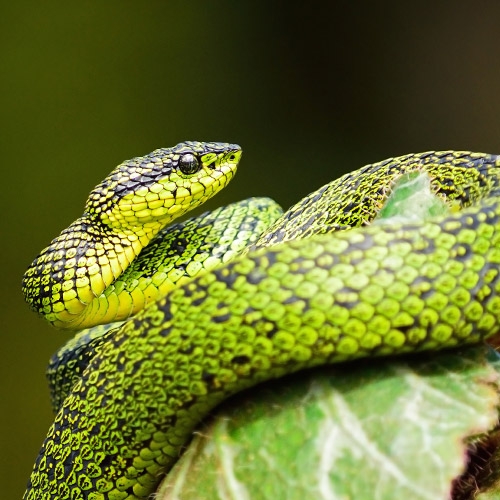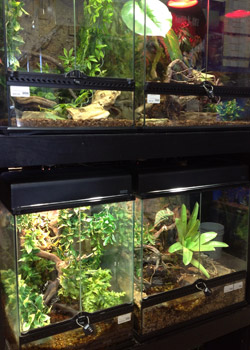{department.name}
Department Info

Reptiles
When someone says they have a reptile or reptiles as pets, your first response is either “Yuck, gross” or possibly “Cool!” Reptiles continue to be one of the fastest growing segments of the pet market even with the most recent additions to the re-stricted list. You may be one of those people who wandered into the store for a bag of dog food and left with a snake and a $300.00 setup. More than 2 millions reptiles are imported into the US each year although that number is rapidly dropping, not because of lack of interest but because of captive breeding which has exploded over the past 10 years. With captive breeding comes the hybrids created from selective breeding of species. Who ever thought there would be more than 25 color variations of the most common lizard kept as a pet, the Leopard Gecko and almost 100 varia-tions of the common Ball Python.
When it comes to reptiles, cold-blooded is a way of life, not a character trait. Reptiles are capable of recognizing people by voice, sight and smell and many are capable of learning. But don’t expect your snake to fetch a ball or jump through hoops. Some species actually benefit from interaction with humans. When cared for properly, all live as long or longer than a similar sized mammal.
Most reptiles are inexpensive. Some are downright cheap. Unfortunately this is why many reptile owners are unwilling to spend the money necessary to properly house and feed their reptiles, or provide them with the veterinary care they require. Com-ments such as “I’m not spending $50 for a light and fixture and why do I need an aquarium that big when the snake is only a foot long.”

As with other pets, the cost of a reptile is usually the least expensive part of keeping one. The initial outlay includes an enclosure, special heating and lighting, substrate, essential furnishings, food and water sup-plies, nutritional supplements, housing and feeding. Ongoing monthly expenses include cleaning and disinfecting supplies, new substrate, food and electricity. Example: The initial habitat setup for a $25 green iguana hatchling will cost from $150 to $250, including an enclosure he will most likely outgrow by the end of his first year. An anole, which you won at the County Fair, has less-extensive requirements than a green iguana. Nevertheless, a basic anole habitat setup includes a 10-gallon enclosure, a UVB-producing fluorescent bulb and fixture, a basking lamp, a nocturnal heat light, thermometers, soil and or gravel, plants, a log or branch for basking and sundry other items such as crickets, a tank for the crickets and cricket calcium supplements and food. Total cost, could be $150.00 or more.
Remember there are no herbivorous snakes and few small herbivorous lizards. Herbivorous tortoises require a great deal of in- door and outdoor space to move around in, as well as lots of grasses and dried hays on which to forage. Herbivorous diets are more complicated and time-consuming to shop for and prepare than carnivorous diets. They are almost impossible to provide if you do not have access to markets with a wide and year-round selection of leafy greens and other nutrient-loaded vegetables. Today’s Pet has a single employee who has been specifically trained to feed our large selection of tortoises including Red & Yel-low Foots, Pancake (world’s only climbing tortoise), Hinge backs, Russians, Greek and Sulcatta as well as our Green and Red Iguanas, Bearded Dragons, Euromastyx Lizards, Chuckwallas, and Crested Geckos. Each morning a large selection of chopped Organic vegetables including Kale, Spinach, Field Greens, Dandelion, Sweet Potatoes, Apples, Squash, Broccoli, Beet Tops, Carrots, and several other seasonal fruits and vegetables are prepared. Each of our tortoises and lizards eagerly wait for meal time at which each animal is carefully monitored for food consumption.
So are we trying to talk enthusiastic first time reptile buyers out of that first pet? No, not at all. We do encourage you to do some reading up before you look to buy. Better yet, come in to the store and talk to one of our knowledgeable reptile care counselors who can guide you through the buying process and help you make the right choice.
Special Offers
We are constantly adding new specials to our site. Be sure to check back often!
Stay Informed
About us
Today's Pet has been family owned and operated since 1996 with a single location serving Elkridge, Columbia and the surrounding areas from Annapolis to Westminster and have more than 30 years experience in the pet industry. We have served as board members with MAPI (The Maryland Association of Pet Industries) for more than 25 years. Here at Today's Pet our main priority is to solidify the companion process by pairing up the right pet for each family situation.






